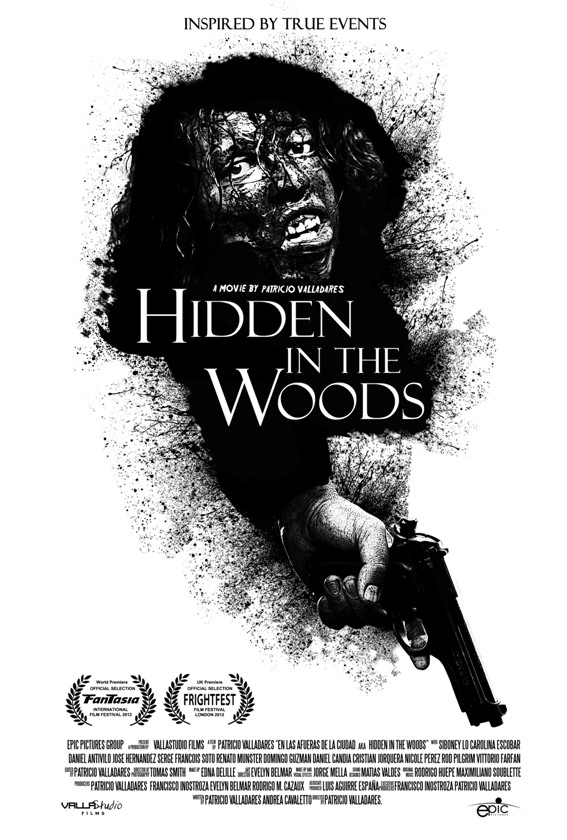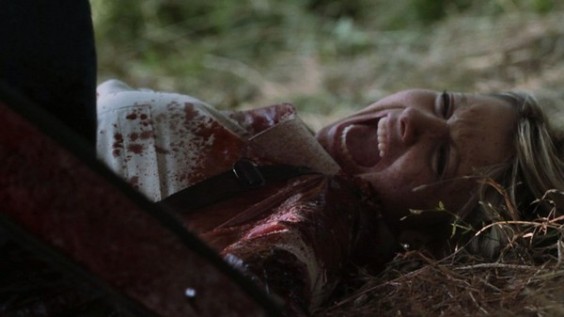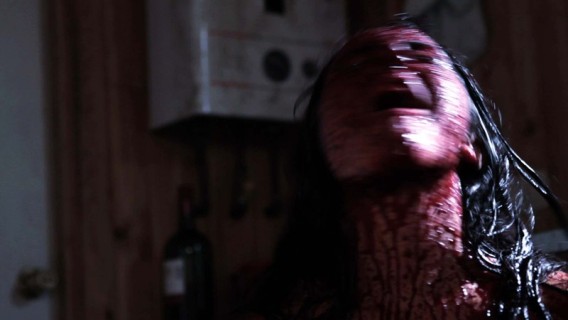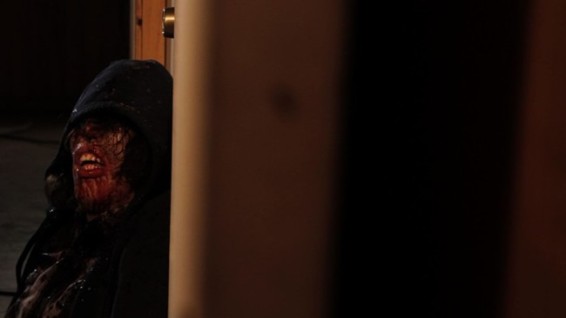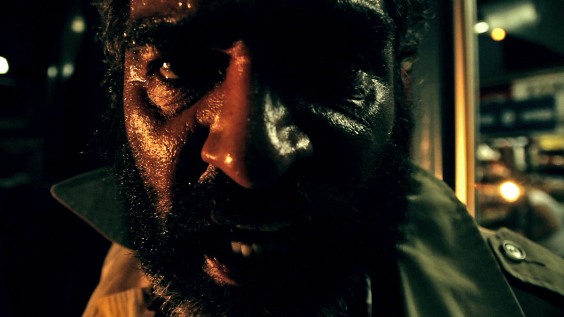HIDDEN IN THE WOODS
HIDDEN IN THE WOODS (EN LAS AFUERA DE LA CIUDAD)
An interview with Patricio Valladares
Conducted, adapted and translated from Spanish by Ariel canadian online pharmacy no prescription needed Esteban Cayer.
——
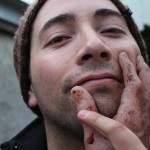 Pure, fearless exploitation cinema is not dead, and perhaps the strongest evidence of that is this year’s incredibly brutal and unrelenting Hidden in the Woods (En las Afueras de la Ciudad) by Chilean underground online pharmacies director Patricio Valladares. Following two sisters and their difformed brother as they escape from an abusive home and are chased by a sadistic drug lord and his goons, don’t let its generic title fool you, because Hidden in the Woods is a whirlwind of violence, despair and familial disintegration one does not get away from unscathed.
Pure, fearless exploitation cinema is not dead, and perhaps the strongest evidence of that is this year’s incredibly brutal and unrelenting Hidden in the Woods (En las Afueras de la Ciudad) by Chilean underground online pharmacies director Patricio Valladares. Following two sisters and their difformed brother as they escape from an abusive home and are chased by a sadistic drug lord and his goons, don’t let its generic title fool you, because Hidden in the Woods is a whirlwind of violence, despair and familial disintegration one does not get away from unscathed.
Ariel Esteban Cayer of Spectacular Optical sat down with director Patricio Valladares to chat production, comic books and a recent surprising acquisition.
——
AEC: The film begins with the mention: “Inspired by true events”. Is that true, or is it simply following the horror film tradition of adding that for buying generic cialis mexico rx the sake of getting people talking?
PV: I’d say half and half. It’s true that mentioning it is “inspired by true events” is something that sells genre films…I’m thinking stuff like Wolf Creek and so many more…but the film is inspired by events that occurred in a rural area near where I live. I also think that in most rural areas, there are stories of abuse. It’s fairly commonplace. So I took some of that, as well as the fact I had previously read some book about horror films that listed the 50 best films based on true events. I noted how much profit they cialis levitra viagra compare had made and how much cult following, they had generated and we decided to go with it. So yes, it is in part inspired by fact, but the mention also adds an extra “hook” to the film, people go “oh!” And sure, the film has a few elements that are more fantastical, but it’s mainly rooted in reality, so it works. It could happen to anyone, essentially.
AEC: You mention Wolf Creek and that sort of film. The film also reminded me strongly – as far as sustained intensity and brutality is concerned – of stuff like The Texas Chain Saw Massacre. What’s your relationship to genre film in Chile or growing up?
PV: Chile is not different from anywhere in the world. I guess the major difference is the Chilean coup d’état. I mean, I didn’t really live it, except maybe for what was left of it when it ended in 1990. Lot of people were locked up at home as result, especially on Saturday and Sunday watching television. Specifically this show Sabado Gigante, hosted by Don Francisco who is a big deal and at the time was a supporter of the coup d’état, which lasted from 1973 to 1990. I was a kid. So all I was able to see was this show Sabado Gigante, which ran all day from noon to 10 at night. There were few cartoons, at best stuff like Mickey Mouse, or Donald Duck. Once the coup d’état ended, stuff started flooding in from outside. Trash metal and video stores! Because I was a kid and really bored by everything that had come before, I started going to those and started watching a lot of horror films, gore films…Robocop, pornography, all that stuff. And from there I got the genre film virus. I started renting VHS tapes as much as possible. Around my twenties, I decided to make an amateur short film with some friends and it stuck. Following that, I started going to film school, but only did two years because it felt like throwing money out the window. So I just decided to put that money in feature films. We made four features film with no money at all and the idea was always to be transgressive. I was obsessed with the films of Takashi Miike, per example. The films had no budget, but they managed to make money off DVD sales in Spain. Following that, two years ago, I submitted this film to the Fondo de Cultura (Culture Fund) and funding came through [Laugh]. Essentially because we pitched as “inspired by true events”…as if the government enjoyed us showing the poverty…
AEC: The historical aspect of it all.
PV: Yeah, what bullshit!
AEC: It really did shock me to learn this was partly funded by the state.
PV: Film are funded by the state all the time in France, though.
AEC: Of course, but weren’t they offended by the content?
PV: The truth is when you set out to make a film, or make stuff that is different, one of the things you have to do is lie. I mean, we pitched something that wasn’t exactly what we were making. We pitched it as a social drama that was important, that talked about narco-trafficking and poverty and such. They were happy with that so we ended up making our horror film! [Laugh]. It was the only way we could get the money. Moreso, the money they gave us was to make a short, but we took that and made a feature so that it could be more profitable. With short films, you’re essentially throwing money in the garbage. Unless you can show it in festivals and you win and they take you out for sushi [Laughs] . Feature films, on the other hand, build anticipation and can be a source of revenue, so that you can make another film.
AEC: What shocked me most is the level of brutality and intensity you manage to maintain throughout. Shattered glass, bullets, shrieks, it never stops. This all seemed very deliberate. What was your strategy, as much on set that in direction, to maintain this intensity?
PV: The idea I had – which was a great idea, but it would’ve been way too problematic – was to have the two girls that are 20 to actually be 10 or 12 years old. They would’ve been 10 or 12 throughout the whole film and I thought that was great, but of course that would’ve offended too many. So the idea was to have something erupt every 5 minutes. Currently, there’s a strong trend in narratives to have everything happen at the end. Wolf Creek, per example, is a film where everything happens at the end. I don’t like that film very much, but I like the end. So a lot of films are currently doing that and because our film was cheap and our actors were terrible [laugh], the idea was that something happens all the time, as much on-screen as through editing. I mean, we had actors that couldn’t act, a low budget, a camera that’s essentially a toy…so we had to make something very dynamic. The editing process was a hassle too because I essentially took care of all the post-production. It had to be really quick paced so that it wouldn’t be boring. Some scenes might be horrible, but quickly the following scene will make you forget it. So I think my main concern with making it like that [snaps fingers] was to make you forget all the scenes that I didn’t like. And of course the fact that I like to shock people. The first cut was nearly two hours but I cut it a lot because it wasn’t effective.
AEC: You say the actors were bad?
PV: Actually, like with any film, strange things happen. Of all the cast, I only had 4 professional actors. Tio Costello [Serge Francois Soto], who is a friend of mine and was in my early films. He’s a professional actor that comes from the school of theater and lives in Chile, very Bela Lugosi-like. The second one was [Daniel Antivilo], the father. Then there was [Siboney Lo] who has worked in the States in Miami (and is actually a better actress in English) and the big-titted one [Caroline Escobar] who was in nothing before. The most important, though, was the non-professional, Jose [Hernandez], the difformed brother, who is in fact a cashier. I saw him I thought “If I go to him, he’ll either get mad and punch me or we’ll start talking”. So I went to him and asked him “Hey, do you like horror films?” He said yes and he was in. He’s surprising. I mean, he has a burned face and a missing arm, but because it’s been so since he was a kid, he’s completely assuming of it. And he gave the best performance. Another actor, per example, is actually a philosophy professor. Most of the actors are not actors, but it works because it’s a very low-budget film. If I had a million, two million dollars to make a movie and had this cast, I would shoot myself!
AEC: Did you have any trouble with actors shooting some of the more difficult scenes? I’m thinking of scene where one of the girls is naked covered in blood…
PV: The plan was always to shoot counter-chronologically. If you look at the film, the scenes near the end are all well-lit, well-framed and at the beginning, everything is frantic and rushed and you’re like “What the fuck is going on?”. It was a budgetary concern. Because we shot it this way, that scene was on the second day of shooting and it the girls had just met each other. So I went and talked to her. I’m very direct and have no filter, so I told her: “It’s your scene. Get naked!” She told me “But there are men around”. “It doesn’t matter, disrobe!” And then she told me she had a problem. “What?” “I’m on my period.” I told her “But that doesn’t matter, because you’ll be covered in blood!” [Laugh]. That was the only major problem. So of course, I cleared the room, she got naked and we shot the scene, initially very shyly but then she got into it. The other complicated thing was with the young actresses playing them at a young age. One of them was good, but on that day, she got on set with a cold and talked like this [holds his nose]. Those were the minor problems. As far as the blood and even the rape scene are concerned, there was no problem. Not as many as one can imagine.
Another thing that worked well is that I would be mean with the actors, so that they would be irritated. It was the summer, and with the added heat from the lights. Everybody was super irritated, hungry and thirsty. Everybody was super tense but it worked out fine.
AEC: I read somewhere you’re also a comic book artist?
PV: Yeah, I did that for a while but got bored because it’s far too solitary.
AEC: I’m asking because the film has a very precise color coding to it. What about it?
PV: Of course. I mean, primarily I really like the visual look of films like the Michael Bay’s Platinum Dunes films, their grain and dirtiness. I’m also very fond of comic book artists like Todd MacFarlane [Spawn], Greg Capullo [Spawn, now draws Batman] and Norm Breyfogle who used to drawn Batman and created the villain Zsasz. So I come from the school of comics that have many lines to them, that seem dirty. And I also like my films to be like that, completely saturated. Something I’ve noticed with recent films shot on digital is that they’re more sepia-toned, subdued. I don’t like that. I like my stuff to be very contrasted.
AEC: The theme and exploration of domestic abuse is really strong in this film. What did you want to say with that?
[Vallastudio Film’s Producer Evelyn Belmar weighs in]
EB: Femicides are incredibly numerous in Chile every year. So this theme of domestic violence is quite resonant in Chile. Be it alcohol abuse from the father, the father being abusive to the the mother, the mother trying to protect her children, and so on. It resonates deeply in Chile because it happens everyday in Chile.
PV: There are many campaigns in Chile for parents to stop hitting their children. But past that, you musn’t take the film seriously. I don’t. This exploration of violence is more a result of the genre. I don’t know what to tell you. I have no justification or explanation for it. I love seeing violence on screen, but it’s not coming from a personal place. The story lent itself to it and like I said, I also like violent comics. The theme of family resonates with many. Rich, poor, middle class, Chile or Europe. There’s abuse, violence and misogyny everywhere.
AEC: I don’t know if you can talk about this now, but I’ve heard about Michael Biehn buying the rights to the film?
PV: It was really weird because I came early for the film market, trying to talk to distributors but also to pitch my next film, which is a home invasion film in line with The Strangers, or something. Some producers liked it and some other thought Hidden in the Woods was too intense. Pussies! [Laughs] One of the last meetings I had was with Jenny [Biehn-Blanc], to ask her if Michael would be interested in acting in my new film. I met her, she was super friendly so I gave her a DVD of Hidden in the Woods, which had the Spanish title on it, En Las Afueras de la Ciudad. She took it, said she was going to watch and it remained very much like “we’ll see”. Then I showed her my poster in the program guide, with the title in English and she asked me “It’s the same movie?!” “Yes.” “Oh! Michael’s been trying to find you for days because he’s seen your film and loves it and wants to talk to you!” So we finally met at the hotel’s bar for a drink and a bite. Michael told me he was anticipating some big tough dude with tattoos [laughs]. So he told me he’d like to remake the film in English. I though “Oh, cool.” I asked “Who would direct it” “You”, he replied. “Oh!” Perfect! And so there we began to talk. I told him I was in talk with some producers and it turned out they all know each other so everything unraveled really quickly. So the idea right now is to start shooting in December or January during the summer in Chile. It’ll be different because it’ll star Michael and I’ll focus on things I couldn’t do in the first film, which is mainly action scenes and aerial shots. And his character, which is the father, will be more of a protagonist. It’ll have more action scenes around him, about how he got involved with drug trafficking and how he had his daughters become cannibals, or rather how they came to eat raw meat to survive. He really liked that character!
AEC: So it’ll be more of an action film?
PV: Well, it’s not only a horror film! And I asked him about the violence and he replied “Not I don’t mind it at all”. So it’ll be the same! It was funny because he was telling me: “I love your film because it’s not violence for the sake of violence”. I was like “Really? Uh?” He told me he had seen a lot of films and only liked mine. I thought “Uh?”. He kept telling me: “It’s justifiable violence” and I thought “Really??” [Laugh] “Like Taxi Driver”, he said. “REALLY?!?!?!?!”, I thought. [Laugh].
——
Don’t miss this exploitation exploit! Hidden in the Woods has its World Premiere on Monday August 6th in the J.A. de Seve theatre at 22h00, with Patricio Valladares in attendance. Repeat screening on Tuesday at 15h00.

 August 6, 2012
August 6, 2012  No Comments
No Comments
